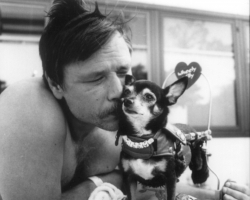A memorial service will be held for a Chihuahua named Wheely Willy at noon, Tuesday, Jan. 19, at the Long Beach Animal Care Services Memorial Garden. The garden is located in the P.D. Pitchford Companion Animal Village at 7700 E. Spring St., Long Beach.
The memorial service is hosted by Long Beach Animal Care Services and Friends of Long Beach Animals.
Wheely Willy, who weighed perhaps 4 or 5 pounds at the end of his days, was a paraplegic dog who became a celebrity over the course of his life.
He was the subject of two books, “How Willy Got His Wheels” and “How Willy Got His Wings,” both written by his human companion Deborah Turner.
“I’ve had him over 20 years,” Turner said.
“Chihuahuas have more longevity than some larger dogs,” Turner said.
Willy died on Dec. 22. He apparently succumbed to injuries he suffered during a fall in January 2009.
Turner said it had been raining. She and Willy were on their way to one of his many public appearances. She slipped while she was carrying him. Turner said she “hydroplaned.” As a result of the fall, she was knocked out. She spent two months in a wheelchair.
Willy suffered more serious injuries than Turner did.
When he passed away, it was in his sleep in bed next to Turner. They had never been apart for the nearly two decades they had been together.
Turner said she has received thousands of messages and letters from friends and fans of the little paraplegic, expressing their love and their condolences.
According to Turner, Willy had fans in the United States, Canada and Japan. He was a frequent guest at schools and VA hospitals.
He was approximately 22 years old when he died.
Willy, you see, was a rescued dog. Turner pointed out that with a rescued animal, there is no birth certificate. You have only the veterinarian’s guess at the animal’s approximate age. Willy was not a puppy when he was found. So Willy’s age could only be approximated.
He was lucky to be found at all. Someone abandoned a cardboard box in Los Angeles. The cardboard box was sealed. Miraculously, someone looked inside the box and found Willy.
Turner said he was hairless on the rear part of his body.
He weighed about 2 pounds. His back was broken. His vocal chords had been severed.
Turner said he was clearly the victim of a trauma.
Yet he had no aggression in him.
She said Willy was completely incapable of defending himself.
Turner said someone saw this dog as a throwaway animal.
Yet everyone she met saw someone of value—“a little bundle of love” who did not know he was disabled.
A veterinarian took him in and cared for him for about a year.
The vet tried to find a home for him.
Yet no one wanted to adopt Willy—either because they didn’t think he would live very long or because they did not want the responsibility of caring for a paraplegic dog.
Tuner was at the time the owner of a pet business—Doggie in the Window, a business she owned for 18 years.
Turner was also actively involved in helping animals. Turner said someone told her about the little dog.
She said that when people saw Willy, they would cry. Yet Willy didn’t know what the fuss was about.
“I thought he was so precious and I felt I could find a home for him,“ Turner said.
In the end, it was Turner who adopted Willy.
When she took him home, he tried to play with the other animals in her home.
He dragged himself on the floor in an attempt to play with the others.
Turner tried to make him more mobile. She described one attempt: she tied helium balloons to Willy to hold up his hind quarters.
However, he was so light that the helium balloons lifted the entire dog off the floor. Then, one day, Turner went to work and saw an ad in a pet magazine.
The ad was for a K9 Cart. Turner bought Willy his first wheelchair. Willy was now mobile. He was immediately off and running. In videos, one of which can be seen on YouTube.com, Willy moved at brisk pace.
“If a dog can use his front legs, there’s no acclimation period,” Turner said.
“It (the chair) really gave me more freedom with the little guy,” Turner said.
He never needed a leash. He always stayed by her side. When they were out in public, people would come up to her and ask questions about Willy.
Turner said she didn’t realize there was a story to tell about the dog.
Yet she started to tell the story anyway. That led to the first of the Willy books, “How Willy Got His Wheels.” Turner said both Willy books were aimed at 10-year-old readers, but the buyers are mostly adults.
The book sales, newspaper and magazine articles ultimately led to public appearances. He traveled to Canada and Japan. Hospitals would invite Turner and Willy to meet with patients who were suffering from depression as well as physical injuries. Willy apparently inspired optimism wherever he went.
Turner said people need inspiration to get them through hard times.
Turner said Willy’s books and his message of courage and hope are still here, even if Willy is not.












